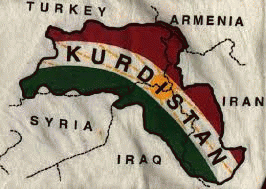For almost a century, the Kurds -- one of the world's largest ethnic groups without its own state -- have been deceived and double-crossed, their language and culture suppressed, their villages burned and bombed, and their people scattered. But because of the U.S. invasion of Iraq, the Syrian civil war, and Turkish politics, they have been suddenly transformed from pawn to major player in a pivotal part of the Middle East.
The Kurds -- who speak a language distantly related to Farsi, the dominant language of Iran -- straddle the borders of north eastern Syria, northern Iraq, and western Iran, and constitute a local majority in parts of eastern and southern Turkey. At between 25 to 30 million strong, they have long yearned to establish their own state. Now, with their traditional foes weakened by invasion, civil war, and political discord, the Kurds are suddenly in the catbird's seat.
But in the Middle East that can be a very tricky place to dwell.
The Kurds' current ascent began when the U.S. established a no-fly zone over northern Iraq following the 1991 Gulf War. When the Americans invaded and overthrew Saddam Hussein in 2003, Iraqi Kurds saw their opportunity: they seized three oil-rich northern provinces, set up a parliament, established a capital at Erbil, and mobilized their formidable militia, the Peshmerga. Over the past decade, the Kurdish region has gone from one of the poorest regions in Iraq to one of the most affluent, fueled in the main by energy sales to Turkey and Iran.
It is an astounding turn of fate.
Twenty-nine years ago the Turkish government was burning Kurdish villages and scattering refugees throughout the region. Some 45,000 people -- mostly Kurds -- lost their lives in that long-running conflict. Today, Turkey is negotiating with its traditional nemesis, the Kurdistan Workers Party (PKK), and trying to cut a peace deal that would deliver Kurdish support to Turkish Prime Minister Recep Tayyip Erdogan's push to amend Turkey's constitution and give him another decade in power.
In 1988, Saddam Hussein dropped poison gas on the Kurdish town of Halabja, killing between 3,000 and 5,000 people. Today, the Iraqi government of Nouri al-Maliki may be outraged by the Kurds' seizure of oil assets, but the Baghdad regime is so preoccupied by a sectarian-led bombing campaign against Shiite communities that it is in no position to do more than protest. Last November, the Maliki government backed away from a potential showdown with the Peshmerga in the northern town of Tuz Khurmatu.
Fifty years ago the Syrian government stripped citizenship rights from 20 percent of its Kurdish minority -- Kurds make up about 10 percent of that country's population -- creating between 300,000 to 500,000 stateless people. Today, Syria's Kurdish regions are largely independent because the Damascus regime, locked in a life and death struggle with foreign and domestic insurgents, has abandoned the northern and eastern parts of the country.
Only in Iran are Kurds in much the same situation they were a decade ago, but with the Teheran government's energy focused on its worsening economic situation and avoiding a confrontation with the U.S. over its nuclear program, that, too, could change.
In short, are the Kurds' stars finally coming into alignment?
Maybe and maybe not. If the invasion, politics, and civil war have created opportunities for the Kurds, they are fragile, relying on the transitory needs or current disarray of their traditional foes, the central governments of Turkey, Syria, Iraq and Iran.
Turkey is a case in point.
Endogen needs the votes of Kurdish parliamentarians to put a new constitution up for a referendum in time for the 2014 elections. Ending the conflict with the Kurds could also boost Turkey's application for European Union membership and burnish Ankara's regional leadership credentials. The latter have been tarnished by a number of Erdogan missteps, including his unpopular support for the Syrian insurgents and his increasingly authoritarian internal policies.
Most Kurds would like to end the fighting as well, but that will require concessions by the Endogen government on the issues of parliamentary representation and the right educate Kurds in their own language.
But Endogen has balked at these two demands, and the Kurds are growing impatient. PKK leader Cemil Bayik recently warned that "September 1 is the deadline" for a deal and a failure to reach an agreement by then "will be understood that the aim [of the Turkish government] is not a solution." Given the long history of animosity, it would not take much to unravel peace talks between the two parties.
Syria's Kurds have threaded a hazardous path between their desire for autonomy -- some would like full independence -- and not taking sides in the current civil war. Indeed, the fighting going on in northern and eastern Syria is not between the insurgents and the Assad government, but Kurds represented by the Kurdish Democratic Union and the combined forces of the extremist al-Nusra Front and the Islamic State of Iraq and the Levant, both of which are affiliated with al-Qaeda.
(Note: You can view every article as one long page if you sign up as an Advocate Member, or higher).






